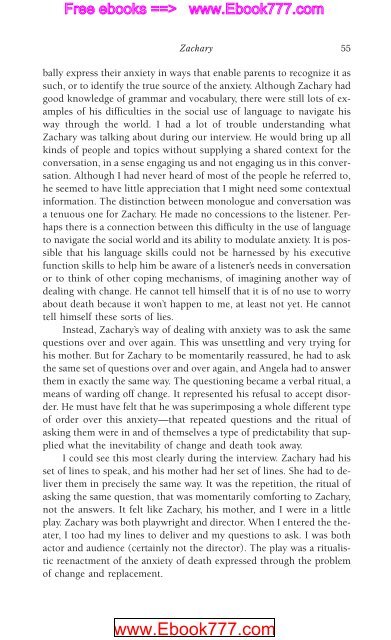978-1572305441
autism
autism
You also want an ePaper? Increase the reach of your titles
YUMPU automatically turns print PDFs into web optimized ePapers that Google loves.
Free ebooks ==> www.Ebook777.com<br />
www.Ebook777.com<br />
Zachary 55<br />
bally express their anxiety in ways that enable parents to recognize it as<br />
such, or to identify the true source of the anxiety. Although Zachary had<br />
good knowledge of grammar and vocabulary, there were still lots of examples<br />
of his difficulties in the social use of language to navigate his<br />
way through the world. I had a lot of trouble understanding what<br />
Zachary was talking about during our interview. He would bring up all<br />
kinds of people and topics without supplying a shared context for the<br />
conversation, in a sense engaging us and not engaging us in this conversation.<br />
Although I had never heard of most of the people he referred to,<br />
he seemed to have little appreciation that I might need some contextual<br />
information. The distinction between monologue and conversation was<br />
a tenuous one for Zachary. He made no concessions to the listener. Perhaps<br />
there is a connection between this difficulty in the use of language<br />
to navigate the social world and its ability to modulate anxiety. It is possible<br />
that his language skills could not be harnessed by his executive<br />
function skills to help him be aware of a listener’s needs in conversation<br />
or to think of other coping mechanisms, of imagining another way of<br />
dealing with change. He cannot tell himself that it is of no use to worry<br />
about death because it won’t happen to me, at least not yet. He cannot<br />
tell himself these sorts of lies.<br />
Instead, Zachary’s way of dealing with anxiety was to ask the same<br />
questions over and over again. This was unsettling and very trying for<br />
his mother. But for Zachary to be momentarily reassured, he had to ask<br />
the same set of questions over and over again, and Angela had to answer<br />
them in exactly the same way. The questioning became a verbal ritual, a<br />
means of warding off change. It represented his refusal to accept disorder.<br />
He must have felt that he was superimposing a whole different type<br />
of order over this anxiety—that repeated questions and the ritual of<br />
asking them were in and of themselves a type of predictability that supplied<br />
what the inevitability of change and death took away.<br />
I could see this most clearly during the interview. Zachary had his<br />
set of lines to speak, and his mother had her set of lines. She had to deliver<br />
them in precisely the same way. It was the repetition, the ritual of<br />
asking the same question, that was momentarily comforting to Zachary,<br />
not the answers. It felt like Zachary, his mother, and I were in a little<br />
play. Zachary was both playwright and director. When I entered the theater,<br />
I too had my lines to deliver and my questions to ask. I was both<br />
actor and audience (certainly not the director). The play was a ritualistic<br />
reenactment of the anxiety of death expressed through the problem<br />
of change and replacement.



